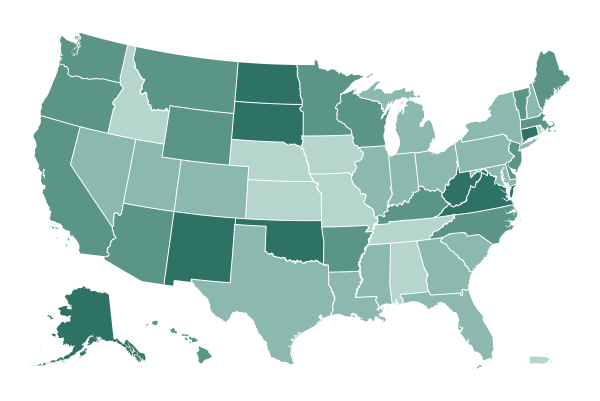transcript
transcript
Los Angeles Temporarily Closes 5 Coronavirus Vaccination Sites
Mayor Eric Garcetti said on Wednesday the city would close five of its Covid-19 vaccination sites, including Dodger Stadium, because of a supply shortage.
-
We’re vaccinating people faster then new vials are arriving, here in Los Angeles, and I’m very concerned right now. I’m concerned as your mayor that our vaccine supply is uneven, it’s unpredictable and too often, inequitable. By tomorrow, the city will have exhausted its current supply of the Moderna vaccine for first-dose appointments. This is an enormous hurdle in our race to vaccinate Angelenos, and unfortunately, it means that we will have to temporarily close Dodger Stadium and the other four non-mobile vaccination sites for two days on Friday and Saturday. As soon as we receive more supply, and I hope that we get — I’d love a call tonight or tomorrow from some source at the state or national level, saying we found some more, but most likely, hopefully Tuesday or Wednesday, we will reopen and start the business up again.
Facing a shortage of coronavirus vaccine doses, Los Angeles will temporarily close five of its inoculation sites, including one of the country’s largest, at Dodger Stadium, raising new questions about the federal government’s handling of supplies and distribution.
By Thursday, the city will have exhausted its supply of the Moderna vaccine for first-dose appointments, Mayor Eric Garcetti said at a news conference. The centers will be closed on Friday and Saturday with plans to reopen by Tuesday or Wednesday of next week, he said.
“We’re vaccinating people faster than new vials are arriving here in Los Angeles,” Mr. Garcetti said. “I’m concerned as your mayor that our vaccine supply is uneven, it’s unpredictable and too often inequitable.”
The United States has struggled to mount a mass vaccination campaign in the face of limited supply and logistical hurdles. President Biden has promised to administer 100 million vaccines by his 100th day in office, which falls on April 30.
The Centers for Disease Control and Prevention said on Thursday that about 34.7 million people have received at least one dose of a Covid-19 vaccine, including about 11.2 million people who have been fully vaccinated.
The federal government has delivered about 68.3 million doses to states, territories and federal agencies, with many kept in reserve for second doses. State and federal officials have come under fire for their handling of vaccines, as demand far outpaces supply and health care providers struggle to predict how many doses they might receive.
About 10 percent of Californians have received a vaccine, according to C.D.C. data.
The city-run Dodger Stadium site opened on Jan. 15 and vaccinated more than 85,000 people in its first two weeks, despite waits that could sometimes last hours. Administrators have reduced wait times, and the site was averaging more than 6,000 shots a day last week, far more than the city’s other sites.
As of Wednesday, Los Angeles had received 316,947 doses, had administered 98 percent of those and had 5,201 on hand, according to city officials. The demand for the vaccine has only increased in recent days, with health care workers and residents aged 65 or older eligible to receive the shots.
The total number of shots given out on Wednesday was a daily record, with nearly 19,000 vaccinated at the five sites and at two mobile clinics. But Mr. Garcetti said Los Angeles had received only 16,000 new doses of the vaccine this week.
Starting in December, California faced a dramatic spike in virus cases concentrated in the southern part of the state and in its main agricultural region, the Central Valley, as well as the spread of a new local strain that may be more transmissible.
California now leads the nation in cases and deaths. Infections peaked around the holidays and have declined since mid-January, but deaths remain at record highs.
Mr. Garcetti said that hospitalizations in Los Angeles were down to about 3,700 on Wednesday, the lowest number in months.
City officials said one of the main issues that led to the shortage was the unpredictability of their allocation of doses. The city does not have its own public health department and receives doses from the county, but the uncertainty at the county, state and federal levels over how many doses are coming in per week has made long-term planning difficult.
“We don’t know what we’re going to get,” said Christopher Covino, who helps oversee vaccine distribution for Mr. Garcetti. “Think of it like income. If I don’t know how much money I’m going to make next week, what do I buy? If you’re planning your life around that, it’s impossible. And if you’re planning a whole massive vaccination program where you’re trying to vaccinate 20,000 people a day, it’s an issue.”
Dodger Stadium was one of several mass vaccination sites to open at stadiums and convention centers across the country. The sites typically give out doses by the thousands in a drive-through format, allowing people to remain in their vehicles. But the mass-vaccine model has run into supply, technical and logistical problems. In Dallas, city officials struggled with technical glitches in its appointment registration system that led to people being turned away at the Kay Bailey Hutchison Convention Center.
Two mass vaccine sites in Arizona, at State Farm Stadium and the Phoenix Municipal Stadium, were not in danger of running out of vaccine, but officials were limiting appointments at the sites based on the anticipated supply of the Pfizer vaccine, said a spokesman with the Arizona Department of Health Services.
Despite shortage concerns, Los Angeles will continue its mobile vaccination program, Mr. Garcetti said. “We can’t afford to see the outbreaks and, quite frankly, the unequal deaths that we’re seeing in communities of color,” he said.

Officials in Michigan have confirmed the presence of a highly contagious coronavirus variant in one of its state prisons, the first such case documented in an American correctional facility — and a potential harbinger of even wider dispersion of the virus in prisons, public health officials said.
Michigan prison and health officials said Wednesday that an employee at the Bellamy Creek Correctional Facility, in Ionia, Mich., was found to have been infected with the B.1.1.7 variant. That strain was first detected in December in the United Kingdom. It has been found to spread more easily than other coronavirus variants.
The variant’s potential to disseminate rapidly in prisons and jails, which are typically overcrowded, unsanitary and have poor ventilation, has alarmed public health experts.
“When we see increased levels of contagiousness in spaces that are overcrowded that really do not lend themselves to social distancing, what we know is going to happen is that there will just be really an explosion of cases,” said Lauren Brinkley-Rubenstein, an assistant professor at the University of North Carolina School of Medicine. “And so it just means more cases, more rapid transmission, and more devastation for incarcerated people and staff that work in jails and prisons.”
Correctional facilities and detention centers have already been devastated by Covid-19, with more than 600,000 infections and 2,700 dead among inmates and correctional officers, according to a New York Times database tracking infections in prisons, jails and detention centers.
Michigan prison officials said that once they had confirmed the presence of the variant, they ordered daily testing of all inmates and staff members in the prison, which has more than 1,600 inmates. As of Thursday, about 500 inmates and 100 correctional officers at the facility had been infected with the coronavirus, and one inmate had died.
As of Thursday morning, it was not clear whether anyone at the prison — aside from the staff member — had been infected by the new variant.
But prison authorities have expressed concern about the possible diffusion of the variant because inmates had been transferred from the Bellamy Creek Correctional Facility to two other prisons, the Duane Waters Health Center and the Macomb Correctional Facility, before officials were aware that the staff member had been sickened.
The Duane Waters facility, in Jackson, is reserved for some of the state prison system’s most severely ill inmates.
The prison system “will be taking extra steps to identify where this variant is present amongst staff and the prisoner population and we will continue to do everything we can to keep the prisoners, our staff and the community safe,” Heidi Washington, director of the Michigan prison system, said in a news release.
Maura Turcotte and
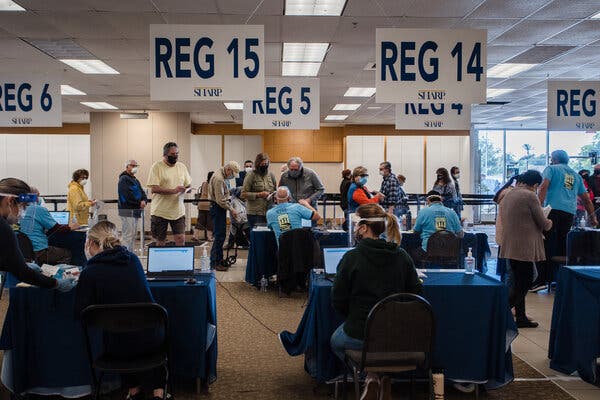
Dr. Anthony S. Fauci, President Biden’s chief medical adviser for Covid-19, said Thursday that most members of the general public could become eligible to get the coronavirus vaccine as soon as April.
“As we get into March and April, the number of available doses will allow for much more of a mass vaccination approach,” he said in an interview with the “Today” co-host Savannah Guthrie.
States have so far been prioritizing vaccines for older people and health care and essential workers, as well as residents of long-term care facilities. Dr. Fauci has said in the past that vaccine availability was likely to increase significantly through the spring.
“I would imagine by the time we get to April, that will be what I would call, for better wording, ‘open season,’” he said on Thursday. “Namely, virtually everybody and anybody in any category could start to get vaccinated.”
It would take “several more months” after that to get the vaccines into most people’s arms, he said, adding that he hoped the overwhelming majority of people in the United States could be vaccinated by mid- to late summer.
Although vaccine distribution in the United States has so far been plagued by confusion, difficulties and delays, the average number of shots administered daily has been increasing steadily since late December. The Centers for Disease Control and Prevention reported that 1.56 million doses were given on Wednesday, bringing the latest seven-day average to more than 1.5 million a day.
The supply of vaccines is also growing, though it is still well below demand. Moderna and Pfizer, whose vaccines have been approved by the U.S. Food and Drug Administration, have been gradually increasing production. The F.D.A. could authorize a one-dose vaccine from Johnson & Johnson later this month, and other vaccines from Novavax and AstraZeneca could also be authorized for U.S. use in the spring.
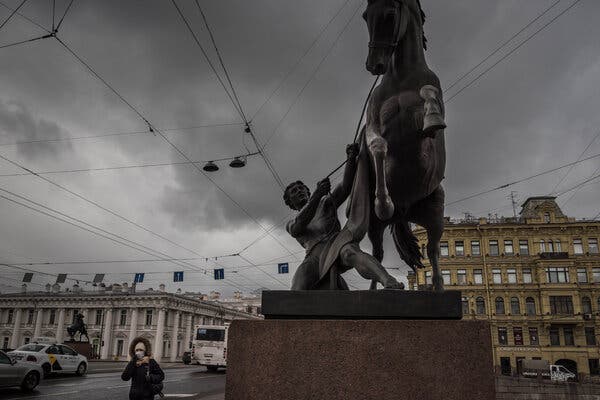
The coronavirus has been used as an excuse to restrict free speech in dozens of countries, according to a report released Thursday by Human Rights Watch, a New York-based advocacy organization.
Pointing to cases of censorship, arbitrary arrest and physical assault, the report found that at least 83 governments around the world have used the pandemic to justify silencing critics or preventing peaceful assembly.
It found that in at least 18 countries, military or police forces assaulted journalists, bloggers or critics of the government’s response to the pandemic, and that in at least 10 countries, officials used social distancing concerns to prevent or disband protests, even while allowing other large gatherings.
The findings expose a tension at the heart of coronavirus restrictions: Some of the same tools officials have used to save lives and slow the spread of Covid-19 — such as restricting large gatherings, countering misinformation or instituting lockdowns — can also be used by authoritarian governments as a pretext to monitor citizens or quash dissent.
China, Cuba, India, Egypt and Russia are among the countries where the restrictions on free speech have been felt most broadly, according to Human Rights Watch.
“The obligation of governments to protect the public from this deadly pandemic is not a carte blanche for placing a chokehold on information and suppressing dissent,” Gerry Simpson, associate crisis and conflict director at the organization, said in a news release.
The report relied on research from Human Rights Watch as well as data and reports from other nongovernmental organizations including the United Nations.
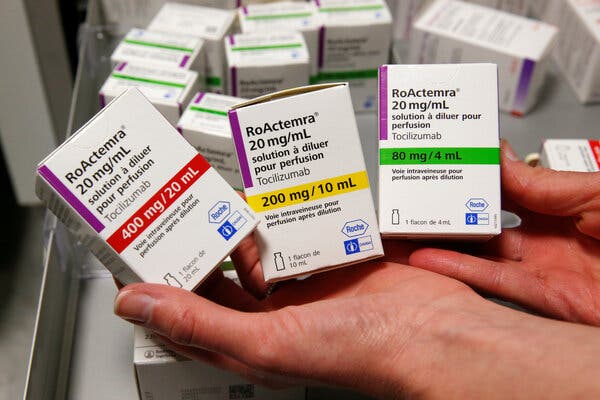
LONDON — An arthritis drug was found to reduce the risk of death for hospitalized Covid-19 patients in a large clinical trial in Britain, bolstering the prospects for widespread use of the drug after promising, but mixed, results in earlier and smaller studies.
The drug, tocilizumab, lowered the death rate in severely ill Covid-19 patients to 29 percent, compared with 33 percent in patients who were not given the treatment, according to a paper posted online on Thursday that has not yet undergone formal scientific review.
Those results translated to one life being saved for every 25 patients treated with the drug, a significant reduction in mortality that would also relieve pressure on overstretched health systems.
Desperate to combat a wave of infections and deaths, Britain encouraged doctors last month to begin using tocilizumab after a smaller study showed promising signs of its effectiveness. The British government said on Thursday that it would now make the drug available to thousands more patients.
“That’s good for patients and good for the health service,” said Martin Landray, a professor at the University of Oxford who helped lead the study, adding that it would pay dividends “not only here in the U.K., but internationally.”
Few drugs so far have been found to reduce Covid-19 deaths in large clinical trials. Steroids like dexamethasone, which was found to reduce deaths by one-third in patients on ventilators and by one-fifth in patients on oxygen, were identified by the same set of clinical trials in Britain, a testament to the role of the country’s centralized National Health Service in allowing researchers to identify Covid-19 treatments.
Drug studies in the United States have been comparatively poorly organized.
“After dexamethasone, this is the most significant advance in the treatment of Covid that has an impact in reducing deaths,” Athimalaipet Ramanan, a professor of pediatric rheumatology at the University of Bristol, said of the findings on tocilizumab.
The study included more than 4,000 patients, half of whom were given the drug on top of standard treatments like dexamethasone, and half of whom were not. Beyond reducing deaths, it also increased the chances of patients being discharged from the hospital within 28 days.
Tocilizumab, an anti-inflammatory drug, works to tamp down the immune system’s reaction to the coronavirus, which can go into overdrive in some instances and destroy the body’s own tissues. A few smaller studies earlier in the pandemic showed little to no benefit in people hospitalized for Covid-19, and doctors have said it may work on some, but not all, patients.
While dexamethasone is relatively cheap — about 5 pounds, or $7, per course — tocilizumab can cost roughly 500 pounds, or $700, per treatment, meaning that it may be less widely available. Even that price, though, is less than the cost per day of an intensive care bed in Britain.
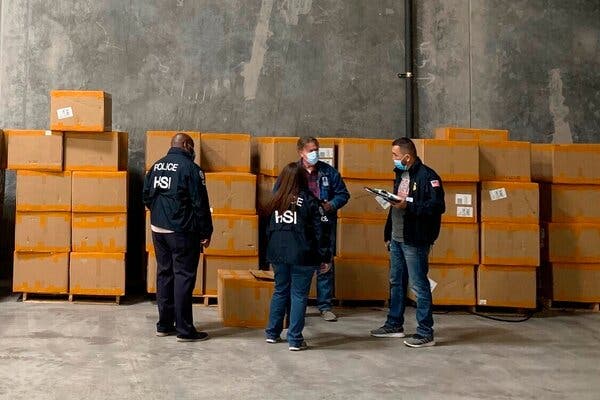
Many were clever fakes.
They were stamped with the 3M logo and shipped in boxes that read, “Made in the U.S.A.”
But these supposed N95 masks were not produced by 3M and weren’t made in the United States, federal investigators said on Wednesday.
They were counterfeits, and millions were bought by hospitals, medical institutions and government agencies in at least five states, the federal authorities said as they announced an investigation.
Homeland Security Investigations, which is part of the Department of Homeland Security, said the masks were dangerous because they might not offer the same level of protection against the coronavirus as genuine N95s.
“We don’t know if they meet the standards,” said Brian Weinhaus, a special agent with Homeland Security Investigations.
Cassie Sauer, the president and chief executive of the Washington State Hospital Association, said that about two million counterfeit masks might have made it into the state. They were “really good fakes,” she said.
“They look, they feel, they fit and they breathe like a 3M mask,” Ms. Sauer said.
News of the investigation came the same day the Homeland Security Department’s intelligence branch warned law enforcement agencies that criminals have been selling counterfeit coronavirus vaccines online for “hundreds of dollars per dose.”
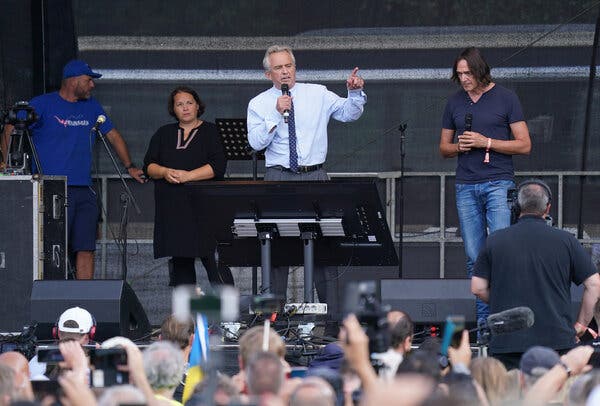
Instagram took down the account of Robert F. Kennedy Jr., the political scion and prominent anti-vaccine activist, on Wednesday over false information related to the coronavirus.
“We removed this account for repeatedly sharing debunked claims about the coronavirus or vaccines,” Facebook, which owns Instagram, said in a statement.
Mr. Kennedy, the son of the former senator and U.S. Attorney General Robert F. Kennedy, worked for decades as an environmental lawyer but is now better known as an anti-vaccine crusader. A 2019 study found that two groups including his nonprofit, now called Children’s Health Defense, had funded more than half of Facebook advertisements spreading misinformation about vaccines.
He has found an even broader audience during the pandemic on platforms like Instagram, where he had 800,000 followers. Though Mr. Kennedy has said he is not opposed to vaccines as long as they are safe, he regularly endorses discredited links between vaccines and autism and has argued that it is safer to contract the coronavirus than to be inoculated against it.
Facebook is becoming more aggressive in its efforts to stamp out vaccine misinformation, saying this week that it would remove posts with erroneous claims about the coronavirus, coronavirus vaccines and vaccines in general, whether they are paid advertisements or user-generated posts. In addition to Mr. Kennedy’s Instagram account, the company said it had removed multiple other Instagram accounts and Facebook pages on Wednesday under its updated policies.
They did not include Mr. Kennedy’s Facebook page, which was still active as of early Thursday and makes many of the same baseless claims to more than 300,000 followers. The company said it did not automatically disable accounts across its platforms and that there were no plans to take down Mr. Kennedy’s Facebook account “at this time.”
Children’s Health Defense did not immediately respond to a request for comment.
Members of Mr. Kennedy’s family have spoken out against his anti-vaccine efforts, including a brother, sister and niece who accused him of spreading “dangerous misinformation” in a column they wrote for Politico in 2019. Another niece, Kerry Kennedy Meltzer, a doctor at NewYork-Presbyterian Hospital/Weill Cornell Medical Center, wrote an opinion essay in The New York Times in December challenging his claims.
“I love my uncle Bobby,” she wrote. “I admire him for many reasons, chief among them his decades-long fight for a cleaner environment. But when it comes to vaccines, he is wrong.”
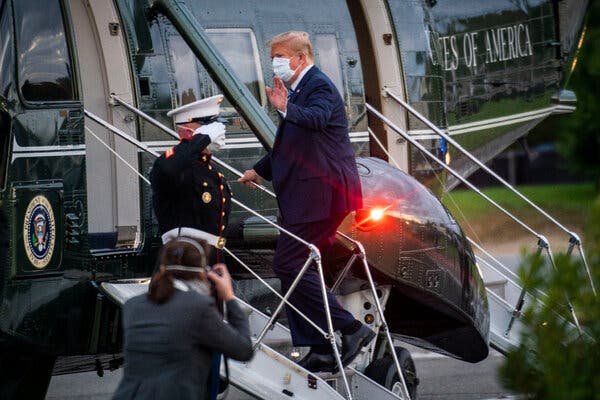
Covid-19 took a worse toll on President Donald J. Trump last October than was publicly acknowledged at the time, according to four people familiar with his condition.
At one point, they said, the president had extremely depressed blood oxygen levels and a lung problem associated with pneumonia caused by the coronavirus.
His prognosis became so worrisome before he was taken to Walter Reed National Military Medical Center that officials believed he would need to be put on a ventilator, two of the people familiar with his condition said.
The people familiar with Mr. Trump’s health said he was found to have lung infiltrates, which occur when the lungs are inflamed and contain substances such as fluid or bacteria. Their presence, especially when a patient is exhibiting other symptoms, can be a sign of an acute case of the disease. They can be easily spotted on an X-ray or scan, when parts of the lungs appear opaque, or white.
Mr. Trump’s blood oxygen level alone was cause for extreme concern, dipping into the 80s, according to the people familiar with his evaluation. The disease is considered severe when the blood oxygen level falls to the low 90s.
The new revelations about Mr. Trump’s struggle with the virus underscore the limited and sometimes misleading nature of the information disclosed at the time about his condition.
The former president resisted being taken from the White House to Walter Reed, relenting when aides told him that he could walk out on his own or risk waiting until the U.S. Secret Service was forced to carry him out if he got sicker, two people familiar with the events said.
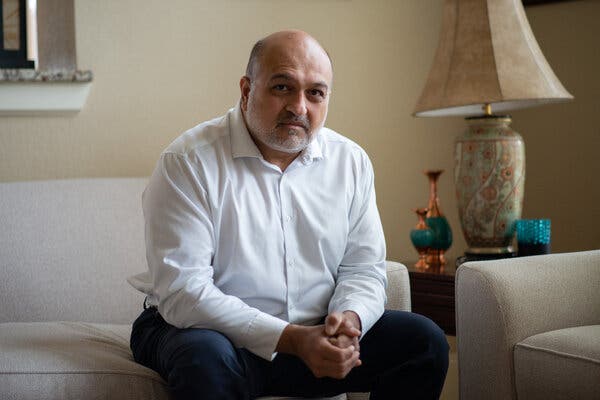
A Texas doctor with only six hours to administer expiring doses of a Covid-19 vaccine inoculated 10 people, but the move got him fired and charged with stealing the doses.
The doctor, Hasan Gokal, had scrambled in December by making house calls and directing people to his home outside Houston. Some were acquaintances; others, strangers. A bed-bound nonagenarian. A woman in her 80s with dementia. A mother with a child who uses a ventilator.
After midnight, and with just minutes before the vaccine became unusable, Dr. Gokal gave the last dose to his wife, who has a pulmonary disease that leaves her short of breath.
For his actions, Dr. Gokal was fired from his government job and then charged with stealing 10 vaccine doses worth a total of $135 — a misdemeanor that sent his name and mug shot rocketing around the globe.
“It was my world coming down,” he said in a telephone interview on Friday. “To have everything collapse on you. God, it was the lowest moment in my life.”
The matter is playing out as pandemic-weary Americans scour websites and cross state lines chasing rumors in pursuit of a medicine in short supply.
Late last month, a judge dismissed the charge as groundless, but the local district attorney vowed to present the matter to a grand jury. And while prosecutors portray the doctor as a cold opportunist, his lawyer says he acted responsibly — even heroically.
“Everybody was looking at this guy and saying, ‘I got my mother waiting for a vaccine, my grandfather waiting for a vaccine,’” the lawyer, Paul Doyle, said. “They were thinking, ‘This guy is a villain.’”
GLOBAL ROUNDUP
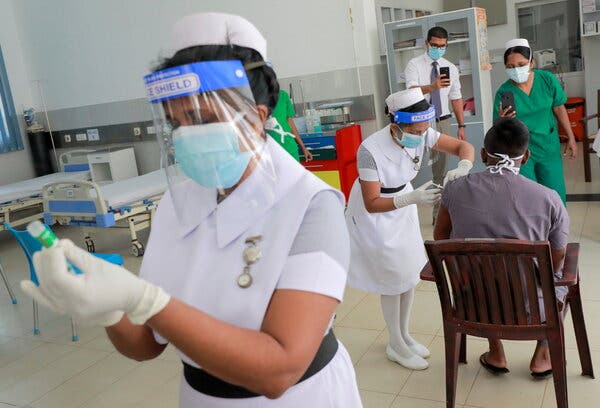
It’s one of the world’s most in-demand commodities and has become a new currency for international diplomacy: Countries with the means or the know-how are using coronavirus vaccines to curry favor or thaw frosty relations.
India, the unmatched vaccine manufacturing power, is giving away millions of doses to neighbors friendly and estranged. It is trying to counter China, which has made doling out shots a central plank of its foreign relations. And the United Arab Emirates, drawing on its oil riches, is buying shots on behalf of its allies.
But the strategy carries risks.
India and China have vast populations of their own that they need to inoculate. Although there are few signs of grumbling in either country, that could change as the public watches doses be sold or donated abroad.
“Indians are dying. Indians are still getting the disease,” said Manoj Joshi, a distinguished fellow at the Observer Research Foundation, a New Delhi think tank. “I could understand if our needs had been fulfilled and then you had given away the stuff. But I think there is a false moral superiority that you are trying to put across where you say we are giving away our stuff even before we use it ourselves.”
For India, its soft-power vaccine drive has given it a rejoinder to China after years of watching the Chinese make political gains in its own backyard — in Sri Lanka, the Maldives, Nepal and elsewhere. Beijing offered deep pockets and swift answers when it came to big investments that India, with a layered bureaucracy and slowing economy, has struggled to match.
So India has sent vaccine doses to Nepal, a country that has fallen increasingly under China’s influence. And Sri Lanka, in the midst of a diplomatic tug of war between New Delhi and Beijing, is getting doses from both.
The donating countries are making their offerings at a time when the United States and other rich nations are scooping up the world’s supplies. Poorer countries are frantically trying to get their own, a disparity that the World Health Organization recently warned has put the world “on the brink of a catastrophic moral failure.”
With their health systems tested as never before, many countries are eager to take what they are offered — and the donors could reap some political good will in reward.
“Instead of securing a country by sending troops, you can secure the country by saving lives, by saving their economy, by helping with their vaccination,” said Dania Thafer, the executive director of the Gulf International Forum, a Washington-based think tank.
In other world news developments:
-
New Zealand will receive the first batch of its 1.5 million-dose order of the Pfizer-BioNTech vaccine next week and expects to begin vaccinating its border workers on Feb. 20, ahead of schedule, Prime Minister Jacinda Ardern announced on Friday. The country, which has all but eliminated local transmission of the virus, has additional purchase agreements with Janssen Pharmaceutica, Novavax and AstraZeneca, and expects to start vaccinating its wider population in the second quarter, Ms. Ardern said.
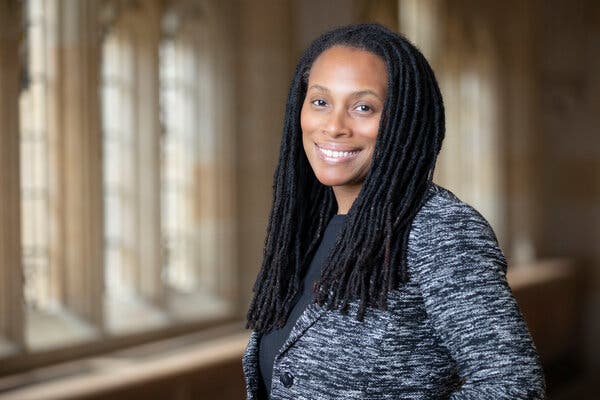
President Biden wants racial equity to be at the essence of a fair national coronavirus response. And Dr. Marcella Nunez-Smith, a Yale epidemiologist who grew up in the U.S. Virgin Islands, is in charge of the effort.
Dr. Nunez-Smith, the chairwoman of Mr. Biden’s Covid-19 equity task force, spoke to The New York Times about the challenges ahead in her role.
She is charged with advising the president on how to allocate resources and reach out to underserved populations to fight a pandemic that has taken a devastating toll on people of color. Black and Latino people have been nearly twice as likely as white people to die from Covid-19.
“Make no mistake about it — beating this pandemic is hard work,” Dr. Nunez-Smith told reporters on Wednesday, after the White House named the members of the task force. “And beating this pandemic while making sure that everyone in every community has a fair chance to stay safe or to regain their health, well, that’s the hard work and the right work.”
Q. You’ve been in office just a few weeks. What have you learned?
A. What’s great about this is being public facing. I hear from everyday Americans every day. People write all the time with their own experiences.
Obviously you cannot cure racial disparities in health care overnight, so what are you aiming for, at least in the near term? And then in the long term?
We’re charged with rapid response recommendations and then paving the way for equity in the recovery. We talk a lot about vaccines, but we can’t forget about everything else. We think about frontline essential workers and others who still have challenges in terms of having inadequate protection in the workplace. Access to testing is also uneven.
It’s exciting to see new technologies emerge, but we also have to make sure that everybody can benefit from all of the scientific discoveries.



